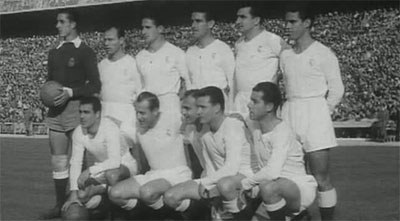Real Madrid Club de Fútbol

|
| Real Madrid in 1953. |
Real Madrid — History, Identity, Royal Legacy & European Dominance
Origins — Birth of the Club (1902)
Real Madrid was founded on 6 March 1902 by brothers Padros in Madrid. Originally named “Madrid Football Club,” the team quickly became one of the leading sides in Spain’s early football competitions. Even from the beginning, the club displayed ambition, strong organization, and a desire to represent the capital with dignity and prestige.
Royal Patronage — The Name “Real”
In 1920, King Alfonso XIII granted the prestigious title “Real” (Royal) and allowed the club to use the crown on its crest. This honor elevated Madrid’s status and symbolized national representation, elegance, and authority — values still associated with the club today.
Pre-La Liga Success & Early National Dominance (1900–1930)
Before La Liga existed, Real Madrid dominated the Copa del Rey, winning several early titles. By the 1920s, the club had already established itself as one of Spain’s football elites. Their disciplined style, strong financial structure, and passionate supporters built the foundation for future greatness.
Santiago Bernabéu — The Man Who Built the Legend (1943–1978)
Real Madrid’s greatest transformation occurred
under club president Santiago Bernabéu.
He modernized the club by:
• building the Santiago Bernabéu Stadium
• creating top-tier training facilities
• investing in world-class players
• developing a global sporting vision
Bernabéu turned Real Madrid from a national club into an international powerhouse — the first truly global football brand.
The Birth of the European Kings — 1950s Dynasty
Real Madrid reshaped world football by dominating the first era of the European Cup. Between 1956 and 1960, they won five consecutive European Cups — a record never equaled. Legends like Di Stéfano, Puskás, Gento, Rial built the club’s European identity: attacking football, elegance, and absolute winning mentality.
Alfredo Di Stéfano — The Greatest of His Time
Di Stéfano is considered one of the most complete players in football history. His leadership, intelligence, work ethic, and versatility shaped the philosophy of Real Madrid. He defined the club’s identity: victory, sacrifice, teamwork, worldwide excellence.
La Quinta del Buitre — Golden Generation of the 1980s
In the 1980s, Real Madrid produced one of the greatest youth generations ever known: La Quinta del Buitre — Butragueño, Míchel, Sanchís, Martín Vázquez, Pardeza. Their electric football dominated La Liga and revived the club’s global identity.
Galácticos — The Age of Superstars (2000–2006)
Under Florentino Pérez, Real Madrid ushered in
the Galácticos era —
signing the world’s biggest stars:
• Figo
• Zidane
• Ronaldo Nazário
• Beckham
• Roberto Carlos
This era elevated the club’s global brand, creating a superstar-filled team that attracted worldwide attention and commercial success.
Cristiano Ronaldo — The Greatest Goal Machine in History (2009–2018)
The signing of Cristiano Ronaldo in 2009 changed Real Madrid forever. He became the club’s all-time top scorer with 450 goals and led the team to unparalleled success.
Achievements during CR7 era:
• 4 Champions League titles
• 2 La Liga titles
• 3 Club World Cups
• Multiple scoring records
Under Zidane and Ancelotti, Real Madrid built one of the greatest dynasties ever known.
The Unthinkable Record — UCL Three-Peat (2016–2018)
Real Madrid became the first club in history to win the UEFA Champions League three consecutive times in the modern era under Zinedine Zidane.
This achievement confirmed Real Madrid as the absolute kings of European football.
Modern Era — Benzema, Modrić, and New Generation
After Ronaldo’s departure, Real Madrid regrouped around new leaders: Karim Benzema, Luka Modrić, Toni Kroos, Casemiro. Benzema won the Ballon d’Or 2022 as Madrid secured another historic Champions League title in 2022 after dramatic comebacks vs PSG, Chelsea & City.
Today, young stars like Vinícius Jr, Rodrygo, Bellingham, Valverde, Camavinga represent Madrid’s future — fast, strong, ambitious.
Real Madrid Identity — Excellence, Ambition & European Royalty
Real Madrid stands for:
• winning mentality
• global excellence
• attacking football
• star power
• historic prestige
The club’s DNA is built on one simple philosophy: win everything, always.

Real Madrid’s crest features the crown, the royal “M,” and the iconic purple stripe — symbolizing royal heritage, national representation, and global excellence.
